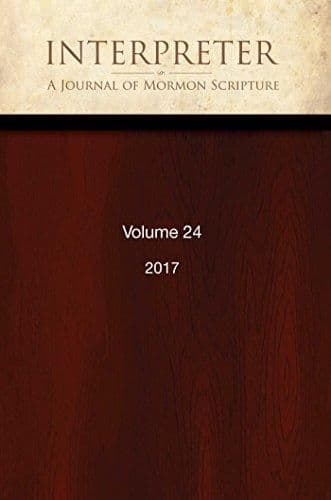Journal
“I of Myself Am a Wicked Man”: Some Notes on Allusion and Textual Dependency in Omni 1:1-2

Title
“I of Myself Am a Wicked Man”: Some Notes on Allusion and Textual Dependency in Omni 1:1-2
Publication Type
Journal Article
Year of Publication
2020
Authors
Bowen, Matthew L. (Primary)
Journal
Interpreter: A Journal of Latter-day Saint Faith and Scholarship
Pagination
71-88
Volume
40
Abstract
Omni greatly revered his ancestors and their personal accounts on the small plates of Nephi. A close examination of Omni’s brief autobiography (Omni 1:1–3) evidences borrowing from all four of his predecessors’ writings. Moreover, his self-description, “I of myself am a wicked man,” constitutes far more than a confession of religious dereliction. That self-assessment alludes to Nephi’s autobiographical wordplay on his name in terms “good” and “having been born of goodly parents” and his grandfather Enos’s similarly self-referential wordplay in describing his own father Jacob as a “just man.” Omni’s name most likely represents a hypocoristic form of a longer theophoric name, *ʾomnı̂yyāhû (from the root *ʾmn), meaning “Yahweh is [the object of] my faith” or “Yahweh is my guardian [or, nursing father],” but could also be heard or understood as a gentilic, “faithful one” or “trustworthy one.” These observations have implications for Omni’s stated defense of his people the Nephites (traditionally, the “good” or “fair ones”) against the Lamanites, those who had dwindled in “unbelief” (cf. Hebrew lōʾ-ʾēmun). In the end, Omni’s description of himself as “a wicked man” should be viewed in the context of his reverence for “goodly” and “just” ancestors and brought into balance with those sacred trusts in which he did prove faithful: preserving his people, his genealogy, and the small plates themselves.
Subject Keywords
Bibliographic Citation
Terms of use
Items in the BMC Archive are made publicly available for non-commercial, private use. Inclusion within the BMC Archive does not imply endorsement. Items do not represent the official views of The Church of Jesus Christ of Latter-day Saints or of Book of Mormon Central.